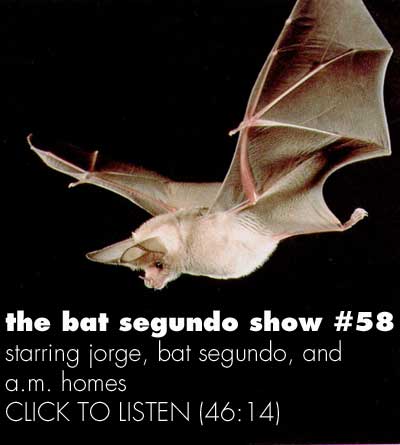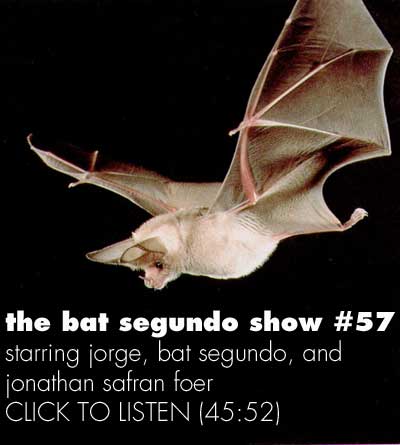Vanity Fair: “Not only are the people at the Times aware of their new readers’ likely lack of constancy, they’re paranoid about it. In some sense, it’s the central obsession at the Times, the driver of the place, this very un-Timesian concern with what people are thinking about it, as the paper increasingly becomes a hot topic in the national court of public opinion. And it’s a crazy court. Every politically and emotionally addled information consumer wants to convict the Timesof something.” (via Books Inq.)
Month / August 2006
Another Litblogger Throws In the Hat
Kevin Holtsberry, who is perhaps too apologetic in his debut, enters the podcasting fray and interviews Brock Clarke concerning this article and more.
Hugo Winners
Locus reports this year’s winners. Robert Charles Wilson’s Spin won the novel award. Connie Willis won for novella. David D. Levine’s “Tk’tk’tk” took the short story award. And John Scalzi nabbed the John W. Campbell Award.
Meanwhile, We Remain More or Less Silent About Our Embarrassing Addiction to Gnarls Barkley
Dallas Morning News Suffers Arts Coverage Atrocities
Dallas Blog: “Will Books go away? Books editor Charles Ealy and critic Jerome Weeks appear to be takers. Lifestyles writers Bryan Wooley, Bill Marvel, Michael Precker and Beatriz Terrazas are listed, among several others. Also investigative reporter Doug Swanson. From the business section, columnist Scott Burns apparently will now have more time to spend in his antique motor home. Artist Randy Bishop is on the goodbye list. Metro is losing some veteran reporters, including Bill Lodge and Tim Wyatt, among others.”
New OutKast Album DOA?
Salon: “Ever since OutKast came out of Atlanta 12 years ago, hip-hop’s beloved duo has been riding one long wave of critical adulation and popular acclaim, each album outselling the last, each album taking a legitimate artistic step forward, and each album confounding expectations. But now, with the tepid and unadventurous ‘Idlewild,’ Antwan ‘Big Boi’ Patton and Andre 3000 (né Benjamin) have done the last thing anyone expected: delivered their first dud.”
Say it ain’t so!
Circle the Wagons, Online Comic Cohorts
Roundup
- “The Religious Experience of Philip K. Dick” by R. Crumb (via Rebecca’s Pocket)
- The scoop on Norman Mailer’s next book. Looks like the old dog might be competing with Tom Wolfe for “worst last novel ever.”
- Douglas Coupland opens a can of whoop-ass on Canadian literature. It’s only available through the New York Times Select portal, but the gist here is that he’s declared it to be at the mercy of the Canadian government.
- The Guardian attempts to find patterns in UK bestseller lists. I know a few conspiracy theorists they might want to consult first.
- C. Max Magee on hard-to-pronounce literary names.
- Newspapers are starting to discover the Internet. At this rate, maybe four years from now, they’ll discover that the Smashing Pumpkins broke up.
- I’m surprised nobody has made the correlation between YouTube and America’s Funniest Home Videos before. Is there some pattern to be found in these videos?
- More on McCraw. It seems that McCraw has now sued former editor Jerry Roberts for $500,000. (via Romenesko)
- “Once More with Hobbits” (via Gwenda)
- Rick Kleffel is reporting from WorldCon.
- Carolyn Kellogg on The Mysteries of Pittsburgh casting call.
- “The Pressure to Be Exotic” (via Booksquare)
- Novelist Masako Bando has confessed that she threw kittens over a cliff that her pet cats gave birth to. As publicity stunts go, I’d say this was maybe a tad extreme. Why couldn’t Bando take out a full-page ad somewhere or get in a physical altercation the way that most batshit crazy authors do? The big question: how will the bar be raised here?
- MySpace: The Magazine.
The Bat Segundo Show #58: A.M. Homes
Author: A.M. Homes
Condition of Mr. Segundo: Trying to remember last night’s conquest, relying upon Jorge’s import/export skills.
Subjects Discussed: Taking on the “male menopause novel,” idioms appropriated by corporations, Kurt Vonnegut, vernacular, throwing the reader off guard, the dropping of letters, character names, donuts vs. bagels, burgers, on being provocative, novelists as ethicists, maintaining an “apocalyptic yet uplifting” tone, Katrina, Michiko Kakutani’s review, Stephen King’s plaudits and the mixed reviews, writing vulnerable male heroes, sensationalistic material, muted realism and decorum, research in Los Angeles, the ass as the great gender equalizer, charlatans and quacks, explaining life within novels, cliches, interconnectedness, Crash, Nathaniel West’s The Day of the Locust, money, and the relative nature of class within fiction.
The Bat Segundo Show #57: Jonathan Safran Foer
Author: Jonathan Safran Foer
Condition of Mr. Segundo: Dismissive of Michael Martone.
Subjects Discussed: San Francisco vs. New York, time-shifting as style, invention as experimentalism, the importance of critics (James Wood, B.R. Myers, Sven Birkets), responding to John Updike’s review, visual elements, designing Extremely Loud in Word, the use of conceptual red ink, the post-9/11 novel, United 93, making the 50 Most Loathsome New Yorkers, public perception, Foer’s side of the Deborah Solomon article, interviews, the real-life inspiration for Mr. Black, Burgess’s Earthly Powers, Bertolucci’s 1900, the influence of photographs upon the text, Joseph Cornell, numbers, -ologists, “…until that day…,” Stephen Hawking, Billy Joel, laughing in the face of tragedy, the “purity” of children, and creative acts.
Blood Car: The Next Snakes on a Plane?
So I was playing a game of “Where are they now?” with my culturally obsessed friend and Anna Chulmsky’s name came up. We wondered what had happened to the girl from the My Girl movies. Well, it was only an IMDB movie listing away before we discovered a film called Blood Car. Here’s the tagline:
In the near future gas prices have reached astronomical highs nearing $40 a gallon. One man, Archie Andrews, an environmentalist elementary school teacher, is trying to discover an alternate fuel source. While experimenting with wheat grass, Archie accidentally stumbles upon a solution. That solution turns out to be blood. HUMAN BLOOD!
That is one deranged movie idea. But I’m a warped man and I would gladly pay $10 to see this movie.
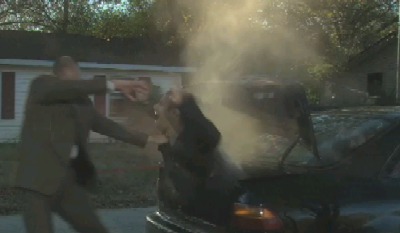 There’s a trailer for the movie at the site, which seems to suggest that the titular car has a blade in the back trunk which chops people up and uses the blood for fuel. A tracking shot reveals gas prices at around $32 a gallon. The main character has the batty name of Archie Andrews. Is it pointed satire? Or just a cheeseball grindhouse flick? More importantly, is there anyone batshit crazy enough to distribute this film? Does a movie like Blood Car have any chance in today’s marketplace?
There’s a trailer for the movie at the site, which seems to suggest that the titular car has a blade in the back trunk which chops people up and uses the blood for fuel. A tracking shot reveals gas prices at around $32 a gallon. The main character has the batty name of Archie Andrews. Is it pointed satire? Or just a cheeseball grindhouse flick? More importantly, is there anyone batshit crazy enough to distribute this film? Does a movie like Blood Car have any chance in today’s marketplace?
Small wonder how the filmmakers got the domain bloodcar.com. I don’t think there was much demand.
Even so, this interview suggests that director Alex Orr has the right influences: “I’m a big Sam Fuller fan and we were just talking about stuff we could rip out of the headlines and we’d been talking about doing a horror movie for a long time and we’d keep seeing these really awful horror movies. You go to Blockbuster and it’s the genre that been excused—you know it’s just “boobs and blood” and it’s not even the right exposures, or good sound. And these films get in the video stores. And we thought let’s make a feature that somebody will get to see. And with the really, really limited resources that we had, a horror [film] seemed the way to go, and we just hopped on the back of the little gas business. So yeah it was pretty much out of frustration. We wanted to make a movie and we heard another movie sold and we jumped up and down and cussed.”
So what of Blood Car‘s future? Storywise, I couldn’t see Hollywood thinking up this premise in a million years. Moneywise, I couldn’t see them backing this.
But Blood Car shows that there’s still quite a bit of cult movie innovation out there. Perhaps we’ll know the verdict once this film hits the festival circuit.
Danger Mouse Would Be Proud
Renee at Book of the Day has an intriguing project. If you’ve read Kazuo Ishiguro’s Never Let Me Go, she’s set up a phone number where you can offer your thoughts. From here, the results either go into some catchy hip-hop montage that you’ll hear playing in all the clubs or a podcast — I don’t really know which. But it does sound groovy and experimental. And I direct all interested parties Renee’s way.
Not Even Moleskines Are Safe from the War on Terrah

Link (via Moleskinerie)
List of Potential New Categories for Pluto
- Small fry
- Midget
- Neptune’s younger, not so nice cousin
- Left-handed
- Oppressed minority
- The planet that nobody talks about
- The guy in the back
- The planet that flies coach
- The planet with one testicle
- Handicapped heavenly body
- The planet on welfare
- Billy Barty in space
- Take this planet. Please.
- Leftovers.
Otto Penzler Threatens Me With a Lawsuit
This post is not a joke.
I just received the following message from Otto Penzler:
“If you don’t remove this TODAY, I will sue your ass. I have already discussed this with my lawyer who agrees it is actionable. You may find this humorous–I don’t. I do have your address and you will be served with a cease and desist order, plus a liable suit, copyright infringement suit, and some other stuff as we think of them. NOW, Mr. Champion.”
Mr. Penzler takes apparent umbrage to several recent posts that satirize and parody his New York Sun columns. To prevent any confusion, I have removed the photos of Mr. Penzler and have added a visible disclaimer that these posts are parodies for the uninitiated (which apparently includes Penzler) about a character named “Otto Peltzer,” not Penzler. Other than this, the posts, for the moment, remain unchanged.
Get Shitfaced for a Good Cause
Much to my regret, I won’t be able to make this. But Jackson West reminds me of tonight’s opportunity to drink booze to contribute to Josh Wolf’s campaign. House of Shields, 39 New Montgomery Street, 7 PM.
We’ll Get Those Evian-Wielding Bastards If It’s the Last Thing We Do!
New York Daily News: “Cops halted a Manhattan subway and examined passengers carrying bottled water and other drinks yesterday after a concerned tipster reported seeing a bottle of suspicious liquid on the No.6 train, police and witnesses said.”
Ugliest Girl in Landscape?
Jonathan Lethem interviews Bob Dylan.
Or Perhaps Even Peripatetic People Magazine Readers Can’t Stomach the Hack Job of a Ghostwritten Celebrity Memoir
Sky News: “Celebrity autobiographies are the books most often abandoned by readers, according to a new survey….’It just shows we have become a nation fixated with celebrities and their lifestyles. All unwanted books are donated to local hospitals and charity shops for people to enjoy reading.'”
Funny Book, Humorless Movie?
Todd Field + Tom Perrotta == Little Children
Whether Through Cybersex, OK Cupid Hookups, or Craig’s List Casual Encounters, Who Can Say?
“Harlequin Positioned to Satisfy Women Online.” Someone at the Book Standard has a sense of humor.
Rejection’s a Virtue?
The Stranger: “Like most 39-year-old, single, jobless, hetero men in Seattle, I thought I knew a thing or two about rejection. Then I decided I wanted to write for a living.”
Bookninja is right. Who can resist that lede? But if Jesse Putnam really wanted to write for the Seattle Post-Intelligencer, he would have delivered the signing telegram.
AC/DC’s Back in Black Revisited
I’m stealing the idea from Tito. Here is an impromptu relistening of AC/DC’s Back in Black.
1. Hells Bells — So Bon Scott is dead, as the track’s opening bells suggest to us. Where does AC/DC go to from here? Well, the mike is placed squarely in Brian Johnson’s hands and, well aware that he’s on tender ground, he’s not content to hog it. In fact, what strikes me listening to this many years later is how Johnson’s vocals are buried in the mix beneath the guitars. The pacing of this opening track is languid, with Johnson settling into the new lineup quite subtly. “I’m coming on like a hurricane,” he says, but you wouldn’t know it from the way Johnson is now carrying himself. The gist here is that Johnson means business and, all tragedy aside, the band plans to kick some serious ass.
2. Shoot to Thrill And finally the amp’s bleedover and the guitar chops at long last find their ground in the song’s opening thirty seconds. The minute that Johnson sings, “Shoot to thrill / play to kill,” the AC/DC we’ve known and loved has returned. How can you not love the moment where the chords that precede the mini-solo just before the three minute mark? And when Young and company go all Who-ish on us with that drumming and Townshend-like chord a mere thirty seconds later , it becomes immediately clear that this — AC/DC’s best record — is a band that has a lot more going behind the minimalism. There’s even a funny homage to Robert Plant’s wails in the song’s final seconds.
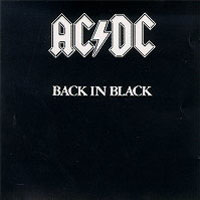 3. What Do You Do for Money Honey — Johnson finally finds his groove and the band boosts up his presence with the grand chorus crescendo. The verses and the subdued guitar here allow Johnson to screech with gusto. And it’s clear that a mere three songs into Back in Black, he’s at long last come into his own.
3. What Do You Do for Money Honey — Johnson finally finds his groove and the band boosts up his presence with the grand chorus crescendo. The verses and the subdued guitar here allow Johnson to screech with gusto. And it’s clear that a mere three songs into Back in Black, he’s at long last come into his own.
4. Givin the Dog a Bone — As odes to fellatio go, this is an okay but by no means totally compelling track — if only because this lacks the gravitas of “What Do You Do for Money Honey.”
5. Let Me Pull My Love into You — The band plays up the bass and drums for this bluesy rocker. Sure, you can quibble with Johnson’s fey assertions of his own masculinity (“Let me cut your cake with my knife”), but it’s the mood here that matters most. The seven triplets that precede the smashing power chord and the “Don’t you…” lines, the sense that AC/DC has deliberately created a song to have methodical yet languorous sex to, and the closing crashes, suggesting a pre-encore concert slot.
6. Back in Black — I’ve heard this song perhaps two hundred times, but every time I hear it while driving, I cannot resist singing like Johnson, particularly at the “Hey hey hey” mark — even when the car is filled with several people. Whatever its weaknesses, “Back in Black” shares a troubling catchiness with another overplayed (and inferior) FM radio song: Journey’s “Any Way You Want It.” This is also, hands down, the best guitar solo on the album.
7. You Shook Me All Night Long — The other major single from the album. I will confess that I never entirely warmed up to this song, with the exception of Johnson wailing the song’s title over guitar. The song’s arpeggios seem too easy for the boys. This was the tune clearly designed for the radio, but AC/DC were at least respectful enough to leave this near the album’s closing. But the song’s finale, suggesting an entirely new song just before fading out, is a nice freakout
8. Have a Drink on Me — Another great bluesy number great for pool halls and bars. A very nice use of fifth chords, complemented by AC/DCs trademark double two-power chord crash near the end, with Johnson offering a testimonial for the pros and cons of loosening up.
9. Shake a Leg — The song opens with a very deceptive snare-hi-hat combo with Johnson wailing his vocals off the track and settling into a new one, followed by the band. The lyrics, alas, offer little aside from “shake a leg” and the song begins to wear out its welcome about two and a half minutes in and it’s comparatively pedestrian to the song’s interesting opening.
10. Rock and Roll Ain’t Noise Pollution — A relaxed way to close out the album, but it’s extremely sad that the song was appropriated by Nike in a spirit that runs counter to the piss and vinegar comedown.
New Orleans Bulldozed
We Are the Weird
Birnbaum Alert
Is DFW Washed Up?
[2009 UPDATE: This article was written by someone who greatly admired David Foster Wallace and hoped he would regain his footing as a writer. It was written before David Foster Wallace’s suicide and without knowledge of the author’s troubled emotional and mental state. (It is highly doubtful that DFW read this site or even cared about my opinion. But had I been informed of his troubled condition, I likely would have written this piece differently.) To preserve history, the article remains unchanged and unmodified from its previous form. I am not interested in revisionism. Nor am I interested in tempering or modifying what I said at the time. Since I have received several emails and comments suggesting the deranged idea that I wrote this article with the hope that DFW would hang himself, let me correct the wingnuts. I wrote this article because I had hoped that the genius who gave us Infinite Jest would return to his former heights. And if you are offended by writing that unhinges your delicate and inflexible sensibilities, or confirms your worldview, I suggest that you hit Alt-F4 right now and join any number of cults, religions, or groups that specialize in such a despicable and counter-intuitive human condition.]
 It goes without saying that I’ve been a DFW fan ever since reading Infinite Jest in 1997. The book in question was absconded third-hand from a man in Sacramento, who gave it to someone else “because you’re smart enough to get this,” and this person in turn gave it to me. The hardcover (who knows if the original owner ever missed it?) sits proudly in my bookcase to this day. At first, I called it Infinite Pest, but once I fell into its groove about 75 pages in, I was tickled by its plot shuffling, its endlessly inventive endnotes, its penchant for detail, and its gleeful sense of the absurd. The book was, outside of Pynchon, one of my first reading experiences involving a mammoth postmodern novel.
It goes without saying that I’ve been a DFW fan ever since reading Infinite Jest in 1997. The book in question was absconded third-hand from a man in Sacramento, who gave it to someone else “because you’re smart enough to get this,” and this person in turn gave it to me. The hardcover (who knows if the original owner ever missed it?) sits proudly in my bookcase to this day. At first, I called it Infinite Pest, but once I fell into its groove about 75 pages in, I was tickled by its plot shuffling, its endlessly inventive endnotes, its penchant for detail, and its gleeful sense of the absurd. The book was, outside of Pynchon, one of my first reading experiences involving a mammoth postmodern novel.
Ten years have gone by since Infinite Jest was the Novel That All Smart People Are Reading. Sure enough, a tenth anniversary volume is in the works from Little, Brown. Since Infinite Jest, Wallace has produced two volumes of fiction and two volumes of essays. But where the other two “prodigious fiction” writers singled out by Tom LeClair (Richard Powers and William T. Vollmann) have proven that they aren’t just cerebral structuralists flaunting their immense knowledge (in many cases working against their own limitations), Wallace, by contrast, has more or less shuffled to the same beat.
Now nobody wants to say this. Even I harbor some small hope that Wallace will either try something daringly different or subject his work to a degree of scrutiny in which peers tear him a necessary new one. But since this has not happened, it’s time to confess the cold hard truth: Wallace has failed to evolve. Why then is he still writing? Phoning it in, as Wallace did with the recent Federer essay, is simply too whorish for a man of his obvious talents.
The stories in Oblivion remain cold, needlessly dense, mired in academese and marketing jargon, and are, for the most part, all fixated on the same cartoonish emotion of detached anxiety. Banging the same drum over the course of a short story collection is, for my money, a cardinal sin. (Even if it is DFW here, it simply must be said.) The essays in Consider the Lobster are certainly amusing, but the only real “evolution” of the Wallace form is contained within “Host,” an essay in which DFW’s footnotes take over the text in an almost desperate way. This is all very fascinating (personally, I preferred the Atlantic colored typesetting to the book’s crude flowchart form), but it still leaves one wondering whether this is truly the best Wallace can evolve. Or if he really wants to be writing.
One looks upon the strange irony of Wallace touring the country for a book while ignoring virtually all interviews and wonders if Wallace is only putting out these books or accepting these gigs to keep a little extra cash coming in. You do what you have to do, I guess. But living at the whims of Bonnie Nadell (or anyone) seems a bit puerile for a man of 44.
It’s worth mentioning that during his San Francisco appearance with Rick Moody last year, Wallace noted that he had attempted a “sentimental” novel, which he abandoned. And I can’t help but wonder if this is symbolic in some sense. Reading his last two books in particular, I detected a joyless timbre, an almost total reluctance to pursue emotions on any subject at all. There was, of course, the brief allusion to religion in DFW’s 9/11 essay, the only essay in Consider the Lobster to contains any real feeling at all. Is it because Wallace wishes to isolate himself from the public? Or is it because he secretly detests writing?
One thing’s for sure: What has happened with Wallace is the same thing that befell Barth after Letters: Barth, like Wallace, had established himself as a professor and his later writing was denuded of the early career zest.
While it breaks my heart to say it, I think Wallace is washed up. He could very well prove me wrong. But if he has nothing playful or interesting to contribute to the world of letters, I’d much prefer it if he threw in the towel and coasted on his past achievements, rather than writing work that sometimes reads and feels as dated and inconsequential as a 1997 episode of Seinfeld.
Chertoff Uses Incomprehensible Charts to Justify “Outdated” Status of the Fourth Amendment
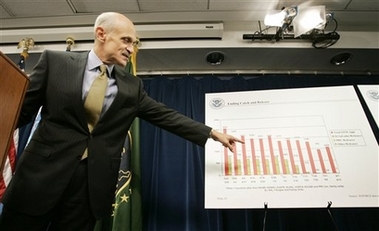
Crapometer Redux
Miss Snark has opened up her pages once again to the Crapometer for her helpful (and, depending upon your point of view, brutal) criticism. Fiction writers who desire to test out the merits of their synopses and first pages might want to give this a try.
David Harsent: Mountain Man in the Making?
Independent: “‘I write poems slowly, not usually on the back of an envelope in a hurry,’ says Harsent. ‘Being a poet is wonderfully isolated. I am fantastically sequestered from the world.'”
